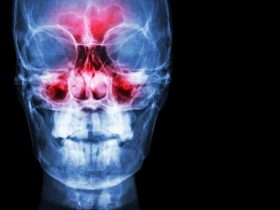At the recent Annual Meeting of the American Rhinologic Society held in Philadelphia, PA, September 9-10, 2022, a team of researchers from the University of Washington Medical Center presented their findings in a poster titled “Prevalence and Associated Factors of Cognitive Dysfunction in Patients with Chronic Rhinosinusitis. “
A number of mechanisms have been proposed, but the cause of cognitive dysfunction in patients with Chronic Rhinosinusitis is still unknown. Chronic Rhinosinusitis (CRS) is a common inflammatory disease characterized by nasal discharge, sinonasal edema, and sinus discomfort, with an estimated prevalence of 12% in the United States. This study aimed to evaluate the prevalence and associated factors of Cognitive Dysfunction (CD) in patients with Chronic Rhinosinusitis (CRS).
Previous studies have shown that about 1 in 6 patients with chronic rhinosinusitis experiences cognitive dysfunction. Cognitive dysfunction refers to the deficit in mental processes involved in acquiring knowledge, reasoning, and manipulating information. It includes learning, perception, memory, attention, decision-making, and language abilities. It is considered chronic when it does not respond to treatment for more than three months and causes disorders that alter patients’ sleep and daily activities, affecting their quality of life. Cognitive dysfunction in patients with chronic rhinosinusitis (CRS) has previously received little attention. A number of mechanisms have been proposed, but the cause of cognitive dysfunction in patients with Chronic Rhinosinusitis is still unknown.
The team of researchers led by Dr. Ashton E. Lehmann evaluated the prevalence and associated factors of Cognitive Dysfunction in patients diagnosed with Chronic Rhinosinusitis. The study included 129 adult patients with CRS based on their initial rhinologic evaluation. Moreover, they collected demographic and clinical data of patients along with the Lund- Mackay imaging and Lund Kennedy endoscopic scores. Other primary outcomes of their study were Sinonasal Quality of Life (QOL) assessed with the Sino-Nasal Outcome Test (SNOT-22) and comorbidities including depression with Patient Heald Questionnaire (PHQ-2) and anxiety with Generalized Anxiety Disorder (GAD-2). The study further assessed Cognitive Dysfunction using the Neuro-QOL Cognitive Function Short Form.
The results indicated that out of 129 CRS patients enrolled, 16.3 percent of the patients have cognitive dysfunction. Also, the CD was associated with worse quality of life as measured by the SNOT-22 scores, self-reported fatigue, and altered sense of smell accompanied by poor scores for sleep, depression, and anxiety.
Although inflammation was proposed to drive the cognitive dysfunction in CRS, there was no association of CD with the Lund Mackay, Lund Kennedy scores and with polyp status. It was also found that CD remained strongly associated with SNOT-22 when controlling for age, anxiety, sex, asthma, and depression. According to the authors, further studies are needed to examine the origin of cognitive dysfunction in rhinosinusitis. The findings from this study are a step toward better understanding these associations for applying therapeutic strategies.



